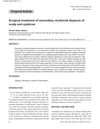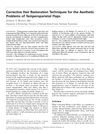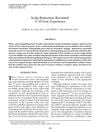 3 citations,
July 2021 in “International journal of environmental research and public health/International journal of environmental research and public health”
3 citations,
July 2021 in “International journal of environmental research and public health/International journal of environmental research and public health” Two patients developed complete hair loss after Alemtuzumab treatment for MS, with no regrowth after two years.
 101 citations,
January 2016 in “Journal of Cutaneous and Aesthetic Surgery”
101 citations,
January 2016 in “Journal of Cutaneous and Aesthetic Surgery” Different types of hair loss need specific treatments, and while many classification systems exist, each has its flaws; more research is needed to refine these systems and treatments.
[object Object]  40 citations,
March 1982 in “British Journal of Dermatology”
40 citations,
March 1982 in “British Journal of Dermatology” Young women with diffuse hair loss may have low SHBG levels, which could lead to more active testosterone and contribute to their hair loss.
 11 citations,
September 2012 in “Journal of obstetrics and gynaecology Canada”
11 citations,
September 2012 in “Journal of obstetrics and gynaecology Canada” Testosterone therapy seems safe for short-term use in postmenopausal women with low sexual desire, but more research on long-term effects is needed.
 January 2009 in “Indian Journal of Plastic Surgery”
January 2009 in “Indian Journal of Plastic Surgery” Surgical methods for hair loss due to scarring should be chosen based on the size, location, and shape of the area, with most patients seeing good results.
 5 citations,
February 2012 in “Aesthetic Plastic Surgery”
5 citations,
February 2012 in “Aesthetic Plastic Surgery” A man developed skin cancer on his scalp after multiple artificial hair grafts.
 6 citations,
March 2003 in “Dermatologic Surgery”
6 citations,
March 2003 in “Dermatologic Surgery” Dr. Dominic A. Brandy developed successful techniques to fix unnatural looks caused by old hair restoration methods, and using oral finasteride and topical minoxidil can help control hair loss in most men.
 28 citations,
May 2013 in “The Journal of Steroid Biochemistry and Molecular Biology”
28 citations,
May 2013 in “The Journal of Steroid Biochemistry and Molecular Biology” Testosterone therapy can improve sexual desire and function in postmenopausal women but should be used cautiously and not based solely on testosterone levels.
 81 citations,
May 2007 in “Fertility and Sterility”
81 citations,
May 2007 in “Fertility and Sterility” Testosterone therapy seems safe for postmenopausal women for a few years, but more research is needed for long-term effects.
 282 citations,
October 2006 in “The Journal of Clinical Endocrinology and Metabolism”
282 citations,
October 2006 in “The Journal of Clinical Endocrinology and Metabolism” The Endocrine Society advised against routine testosterone therapy for women, citing a need for more research on long-term safety and a clear definition of androgen deficiency.
 41 citations,
July 2017 in “Journal of The American Academy of Dermatology”
41 citations,
July 2017 in “Journal of The American Academy of Dermatology” Men with Frontal fibrosing alopecia typically lose hair on the front scalp and sometimes on sideburns and upper lip, with treatments showing varied success.
 January 2017 in “Acta dermato-venereologica”
January 2017 in “Acta dermato-venereologica” The congress showed that psychological therapy can help skin condition patients, social media affects acne stigma, education improves atopic dermatitis, and patient satisfaction in dermatology is high, especially with good doctor engagement.
 24 citations,
September 2001 in “Journal of The American Academy of Dermatology”
24 citations,
September 2001 in “Journal of The American Academy of Dermatology” Women's ovarian hormones and adrenal androgens change throughout life, affecting hair loss and health.
 56 citations,
April 1998 in “Steroids”
56 citations,
April 1998 in “Steroids” Finasteride reduces hair loss and treats BPH without major hormone changes, but may cause sexual dysfunction.
 May 2021 in “Journal of the Endocrine Society”
May 2021 in “Journal of the Endocrine Society” A patient produced cortisol after adrenalectomy, possibly due to residual tissue or other body parts making steroids.
 151 citations,
December 2004 in “Annals of the New York Academy of Sciences”
151 citations,
December 2004 in “Annals of the New York Academy of Sciences” Congenital Adrenal Hyperplasia is a genetic disorder with two forms, causing symptoms like early puberty and severe acne, but can be identified through screening and treated with glucocorticoids.
11 citations,
April 2013 in “Homo” Darker skin in 10-year-old girls may be an early sign of puberty.
 December 2002 in “International Journal of Cosmetic Surgery and Aesthetic Dermatology”
December 2002 in “International Journal of Cosmetic Surgery and Aesthetic Dermatology” Scalp reduction surgery is safe and effective for certain patients with hair loss, leading to dense hair coverage and high satisfaction.
 1 citations,
October 2008 in “Expert Review of Dermatology”
1 citations,
October 2008 in “Expert Review of Dermatology” Frontal Fibrosing Alopecia is a slowly progressing hair loss condition, likely underdiagnosed, with ineffective treatments, needing more research to understand it fully.
 70 citations,
January 2000 in “Hormone Research in Paediatrics”
70 citations,
January 2000 in “Hormone Research in Paediatrics” SAHA syndrome is a condition in women involving skin and hair issues, often related to hormonal imbalances, and is treated based on the underlying cause.
 October 2024 in “Journal of the Endocrine Society”
October 2024 in “Journal of the Endocrine Society” A woman experienced fluctuating thyroid conditions and eye disease, but her symptoms improved with treatment.
 August 2019 in “Regenerative Medicine”
August 2019 in “Regenerative Medicine” In June 2019, the stem cell research field saw major progress, including new clinical trials, FDA approvals, and industry collaborations.
 9 citations,
August 1952 in “The Journal of Clinical Endocrinology & Metabolism”
9 citations,
August 1952 in “The Journal of Clinical Endocrinology & Metabolism” A 17-year-old female with adrenogenital syndrome produces very high levels of androgens, which prevent complete feminization despite high estrogen doses.
 48 citations,
February 2013 in “Molecular and Cellular Endocrinology”
48 citations,
February 2013 in “Molecular and Cellular Endocrinology” The protein StAR is found in 17 different organs and can affect hair loss and brain functions, but its full role is not yet fully understood.
 98 citations,
February 2013 in “Journal of The American Academy of Dermatology”
98 citations,
February 2013 in “Journal of The American Academy of Dermatology” Dutasteride may help stabilize Frontal Fibrosing Alopecia, but more research is needed.
16 citations,
January 2019 in “Pharmaceutical biology” Lespedeza cuneata extract may help treat enlarged prostate.
[object Object]  61 citations,
January 2019 in “American Journal of Clinical Dermatology”
61 citations,
January 2019 in “American Journal of Clinical Dermatology” The cause of Frontal Fibrosing Alopecia is unclear, diagnosis involves clinical evaluation and various treatments exist, but their effectiveness is uncertain.
 65 citations,
January 2011 in “Frontiers in Endocrinology”
65 citations,
January 2011 in “Frontiers in Endocrinology” Neurosteroids show promise for treating epilepsy and more research is needed.
 15 citations,
December 2013
15 citations,
December 2013 Men with more vanadium in their blood and who drink less soy milk are more likely to have hair loss.
 2 citations,
August 2013 in “The Lancet. Diabetes & endocrinology”
2 citations,
August 2013 in “The Lancet. Diabetes & endocrinology” The FDA rejected a testosterone drug again due to safety concerns.




























